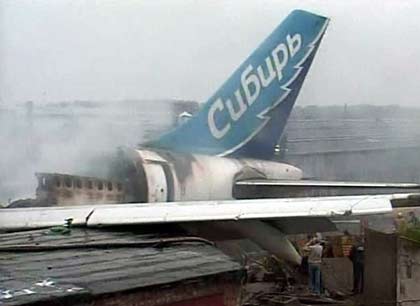MOSCOW - The brakes on a Russian plane may have failed as it landed and
careened into garages in a fiery crash that killed at least 122 people in the
country's second major commercial airline disaster in two months, Russian news
agencies reported Sunday.
Early information gathered by investigators indicated that the braking system
on the Airbus A-310 operated by Russian airline S7 had malfunctioned, the news
agencies reported, citing unnamed sources.

A video
grab shows rescuers near the tail of an Airbus A-310 which crashed at the
airport of Russia's Siberian city of Irkutsk on July 9, 2006. The Russian
passenger plane carrying 200 people, many of them holidaymakers, crashed
during a domestic flight to Siberia on Sunday, killing most of those on
board, news agencies said. [Reuters] |
The plane was carrying at least 201 people on the 2,600-mile flight east from
Moscow to the Siberian city of Irkutsk. Fifty-eight people were injured.
An air stewardess, Viktoria Zilberstein, opened the emergency hatch in the
rear of the burning plane, according to the Emergency Ministry. Ten passengers
escaped this way, and others - including a pilot - were saved by rescuers
including firefighters, ITAR-Tass reported.
Relatives streamed to a crisis center near Moscow's Domodedovo airport, where
the flight originated. Some stumbled out in silent shock. One woman ecstatically
exclaimed into her cell phone that a family friend had survived.
After veering off the runway at about 7:50 a.m., the plane tore through a
6-foot-high concrete barrier, crashed into a compound of one-story garages and
stopped a short distance from some small houses.
"I saw smoke coming from the aircraft. People were already walking out who
were charred, injured, burnt," a witness, Mikhail Yegeryov, told NTV television.
"I asked a person who was in the Airbus what happened, and he said the plane
had landed on the tarmac but didn't brake. The cabin then burst into flames,"
Yegeryov said.
Pilots regard the Irkutsk airport as difficult because its runway slopes and
its concrete is especially slippery when wet, Vladimir Biryukov, an expert at
the Gromov Aviation Institute, said on NTV.
Transport Minister Igor Levitin said the pilot had radioed ground control to
say the aircraft had landed safely and then communication cut off.
"There was rain, the landing strip was wet. So we'll have to check the clutch
and the technical condition of the aircraft," he told Russian state television.
He said the aircraft's two recorders had been recovered and were being analyzed.
He provided no further details and other Russian officials could not be
reached for comment on the reports that the brakes on the plane may have failed.
Airline spokesman Konstantin Koshman said there were 193 passengers -
including 14 children ages 12 and under - and a crew of eight aboard. He said
the plane, constructed in 1987, had been regularly maintained and met all
certifications.
Many of the children were headed to nearby Lake Baikal on vacation, according
to news reports.
President Vladimir Putin conveyed his condolences to relatives of the victims
and declared Monday a national day of mourning.
Three people whose names were not on the passenger list were pulled
unconscious from the wreckage; it was unclear if they had been on the ground or
were flying unregistered, Emergency Ministry spokeswoman Natalia Lukash said.
Outside the crisis center, a man who gave his name only as Vyacheslav said
his brother, sister-in-law and their 4-year-old son had been on the plane and
were not on the list of survivors.
He stood grimly on the grass while his friend Larisa Kolcheva, 27, sat on a
curb fighting back tears. "They were sitting with us in a cafe literally
yesterday evening," she said.
Roman Gavrilov, 27, said his father - who was not yet accounted for - had
gone to Irkutsk for a fishing trip with old army buddies, his first vacation in
three years. "We still have hope," he said.
In May, an Airbus crashed in stormy weather off Russia's Black Sea coast as
it prepared to land, killing all 113 people on board. Airline officials blamed
the crash of the Armenian passenger plane on driving rain and low visibility.
S7, formerly known as Sibir, is Russia's second-largest airline, a regional
outfit carved out of Aeroflot's Siberian wing after the collapse of the Soviet
Union. Cash-strapped and saddled with aging planes, such airlines were once
notorious for their disregard for safety, but their records have improved in
recent years.
Sunday's disaster was the fourth air crash in Irkutsk in the past 12 years:
In January 1994, a Tu-154 aircraft crashed on takeoff; killing 124; in
December 1997, an An-124 military transport aircraft crashed in a residential
area, killing 72; and in July 2001, a Tu-154 crashed near Irkutsk, killing all
143 on board.